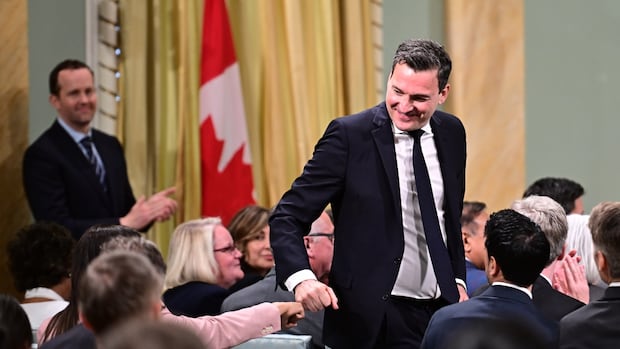Canada has its first-ever minister of artificial intelligence in veteran broadcaster and newly elected Toronto Centre MP Evan Solomon.
So what does that job exactly entail?
When asked what Solomon’s mandate and responsibilities will be, a spokesperson from the Prime Minister’s Office (PMO) pointed to the Liberal platform as “the best bet for now.”
The platform, released a little over a week before the April 28 election, suggests Solomon will have a massive job touching nearly every aspect of the economy and with national security considerations.
His boss Mark Carney has called for sweeping use of artificial intelligence to create the “economy of the future,” incentivize businesses to adopt AI and build the infrastructure needed to support all that work.
“Artificial intelligence is the key to unlocking productivity, higher paying jobs and new prosperity that will benefit everyone,” the document promises.
Adegboyega Ojo, Canada Research Chair in Governance and Artificial Intelligence (AI) at Carleton University, said the new cabinet position — and the platform — sends the right signal.
“Prime Minister Carney is walking the talk,” he said.
“They’ve done their homework in terms of where the issues are and what needs to be done.”
When it comes to the federal government, the platform calls for AI to slash repetitive tasks and reduce costs in the public service.
And it calls to set up an office of digital transformation, something Solomon — whose full title is minister of artificial intelligence and digital innovation — will likely oversee.
“This is about fundamentally transforming how Canadians interact with their government, ensuring timely, accessible and high-quality services that meet Canadians’ needs,” notes the platform.
“This could mean using AI to address government service backlogs and improve service delivery times, so that Canadians get better services, faster.”
Ojo said AI-powered virtual assistants, or chatbots, could easily help Canadians get basic information from the government in any language they need.
“In a way that is really comprehensive, even more comprehensive than what, you know, a human agent at the other side may be able to [do],” he said.
Behind the scenes at the public service, he said AI could speed up translation, rewrite technical documents in plain English, analyze documents for legal compliance and draft briefing notes.
Platform calls to ‘supercharge’ AI adoption
Industry watchers say one of the biggest challenges for Solomon will be getting the private sector to adopt AI.
Benjamin Bergen, president of the Council of Canadian Innovators, said Canada has a reputation as a leader in AI research, but is a laggard when it comes to use and commercialization.
Carney’s platform promises to introduce a tax credit to incentivize AI adoption by small and medium-sized businesses and connect Canadian researchers and startups with businesses across the country to “supercharge adoption.”
“The key piece here is, we’ve got this artificial intelligence, but then how do we actually ingest it into our society, not only from a government lens, but also from a private-sector lens as well? said Bergen.
Bergen pointed to John Deere, a farming company best known for its green-and-yellow tractors which has become a leader in farming AI and data analytics. It uses technology to tend to crops more effectively, monitor field conditions and determine what maximizes yields.

“When we think about things like mining, forestry and other areas, how are we using artificial intelligence to create better outputs, to create greater productivity?” said Bergen.
Graham Dobbs, senior research associate in innovation and technology at the Conference Board of Canada, said another known issue for Canada is intellectual property retention.
“We have a really hard time creating patents and then retaining them in the country, retaining them among innovators who are working for firms in Canada,” he said.
“They tend to go to the U.S. and they make, you know, over 50 per cent more.”
Ojo said there’s also more pressure than ever to keep Canadian talent in Canada as the economy shifts in response to U.S. President Donald Trump.
“If you don’t satisfy the ambition — they want to build companies, they want to do great stuff and they cannot do it — they will go to other places,” he said.
Carney commits to building data centres
The Liberal platform also has an emphasis on building Canadian-owned AI infrastructure, including data centres and high-speed and reliable communication networks.
That’s crucial, says Bergen, for Canada’s sovereignty.
“Imagine when we were building the railroad, which built this nation from east to west, if we had allowed foreign agents to determine what goods we could put on the railroad, what goods could travel, who could travel,” he said.
Access to the massive amounts of data AI generates and analyzes is also important.
“If we have a data centre that’s, let’s say, storing our health-care data, but it’s located inside the United States, things like the Patriot Act and the Cloud Act allow the American government to access it,” he said.
“Nations that were once friendly with us, you know, might not be in the future. And we really have to consider what does that mean from not only a privacy perspective, but also an economic sovereignty perspective as well.”
AI bills waiting to be reintroduced
Solomon also has the thorny challenge of figuring out how to regulate artificial intelligence and what guardrails should be in place.
Dobbs said a suite of bills — the Artificial Intelligence and Data Act, the Online Harms Act and the Act Respecting Cyber Security — tackle some concerns with AI but died when Parliament was prorogued in January.
He said they should be reintroduced, weaving in some of the feedback and criticisms the government has heard.
“Ensuring that, you know, the trust and security of Canadians are on the forefront,” said Dobbs.
Solomon’s role will be further clarified when Carney gives him a mandate letter — something the government has suggested would be made public.
The industry department, now overseen by Minister Mélanie Joly, will support Solomon’s work, said the PMO.
